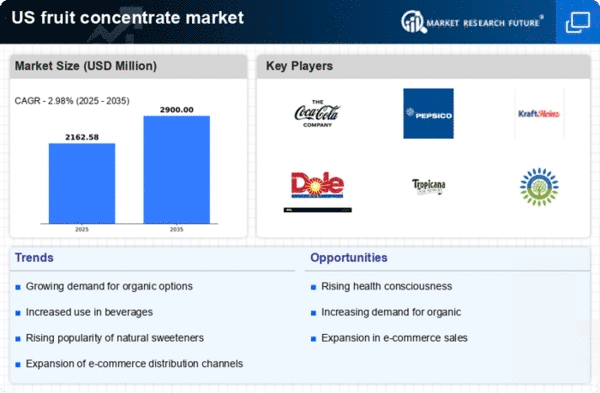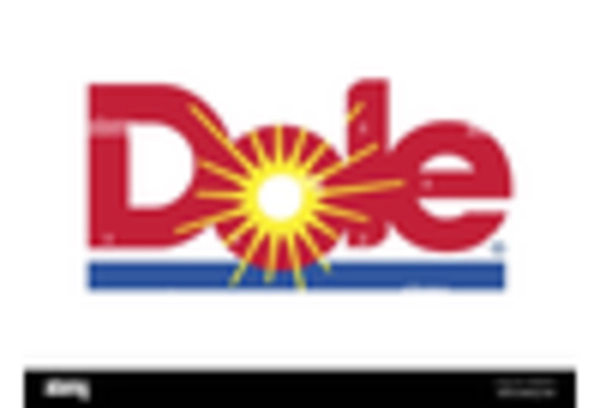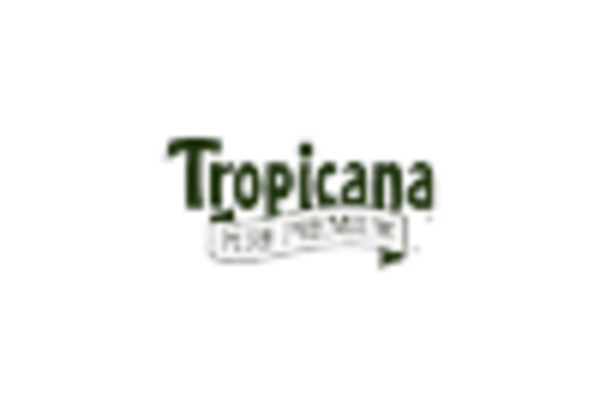Growth in Food Processing Sector
The fruit concentrate market is benefiting from the growth in the food processing sector, which increasingly utilizes fruit concentrates as key ingredients in various products. The demand for convenience foods, such as ready-to-eat meals and snacks, is driving manufacturers to incorporate fruit concentrates for flavor enhancement and nutritional benefits. Data shows that the food processing industry is projected to grow at a rate of 4% annually, further bolstering the fruit concentrate market. The fruit concentrate market is thus positioned to capitalize on this trend by providing high-quality concentrates that meet the needs of food processors looking to innovate and diversify their product offerings.
Expansion of Beverage Applications
The fruit concentrate market is witnessing significant growth due to the expansion of beverage applications. With the increasing popularity of fruit-based drinks, including juices, smoothies, and flavored waters, manufacturers are incorporating fruit concentrates to enhance flavor and nutritional value. Market analysis suggests that the beverage segment accounts for over 50% of the total fruit concentrate market share in the US. This trend is likely to continue as consumers gravitate towards healthier beverage options. The fruit concentrate market is responding by innovating new formulations that cater to diverse consumer tastes and preferences, thereby driving overall market growth.
Rising Demand for Natural Ingredients
The fruit concentrate market is experiencing a notable surge in demand for natural ingredients, driven by consumer preferences for healthier and more authentic food options. As awareness of artificial additives and preservatives grows, consumers are increasingly seeking products that contain natural fruit concentrates. This trend is reflected in market data, which indicates that the market for natural fruit concentrates is projected to grow at a CAGR of approximately 6.5% over the next five years. The fruit concentrate market is adapting to this shift by sourcing high-quality, organic fruits, thereby enhancing product appeal and meeting consumer expectations for transparency in ingredient sourcing.
Increased Focus on Clean Label Products
The fruit concentrate market is influenced by the rising consumer demand for clean label products, which emphasize transparency and simplicity in ingredient lists. As consumers become more health-conscious, they are scrutinizing product labels for artificial ingredients and additives. This shift is prompting manufacturers within the fruit concentrate market to reformulate products, ensuring that they contain only natural ingredients. Recent surveys indicate that approximately 70% of consumers are willing to pay a premium for clean label products. This trend is likely to propel the growth of the fruit concentrate market as brands strive to meet these evolving consumer expectations.
Emerging Trends in E-commerce Distribution
The fruit concentrate market is experiencing a transformation due to emerging trends in e-commerce distribution. As online shopping continues to gain traction, consumers are increasingly purchasing food products, including fruit concentrates, through digital platforms. This shift is reshaping the distribution landscape, allowing manufacturers within the fruit concentrate market to reach a broader audience. Recent statistics indicate that online grocery sales are expected to account for 20% of total grocery sales by 2026. This trend presents a significant opportunity for the fruit concentrate market, as brands can leverage e-commerce to enhance visibility and accessibility, ultimately driving sales growth.
















